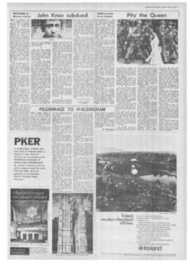Page 6, 6th March 1970
Page 6

Report an error
Noticed an error on this page?If you've noticed an error in this article please click here to report it.
Tags
Share
Related articles
A Philosophical Approach To
Crime And Punishment
Russia Is Pure Capitalism
Novels Out Of France
An Interest In Television
VICE AMONG THE PRIVILEGED
by MARTINE LEGGE
Six Studies in Hypocrisy by Giles Playfair (Seeker & Warburg 50s.)
IN this country we believe that the duty of those who sit in judgment upon their fellows is first to establish beyond all reasonable doubt whether they have committed the crime of which they are accused and, secondly, to mete out punishment according to the gravity of the offence and in relation to the deterrence of others and the reform of the criminal; and that no other factors should in any way affect judgment or the choice and extent of punishment.
Could it then be possible that the administration of justice is not as invariably proof against external pressures as we would like to think? Giles Playfair argues that the answer to this question is not as clear cut as it is often made out to be.
His thesis is that the stability of our society has depended from time to time on a kind of
organised hypocrisy operated through the agencies of the Press and the Law and that some of the trials of eminent people, or causes celehres, have been used as a camouflage for political or social vengeance or as a means of safeguarding the ruling class from imputations against its fitness to exemplify virtue, thus warding off threats to the maintenance of class structure.
In this book he is far more ambitious than most authors who set out to report or comment upon interesting trials. His very readable account of six causes Mares range from 1825 to Stephen Ward's trials in 1963 and he uses these to illustrate his conviction that such trials have often fulfilled
very different purposes from that of merely repressing crime or redressing wrongs. After reading them all one is certainly left with the impression that neither the judiciary, nor the Press, nor indeed the public, came out of each story in a way which did any of them much credit.
The first case is that of Edmund Keane, the richest and most successful actor of his day. The suit alleged "criminal conversation" (adultery) between Keane and the wife of an alderman of the City of London.
Although Keane was a famous man and thus liable to have his affairs aired by the gutter press for the benefit of public curiosity, such suits were fairly frequent and not the kind of thing to set tongues wagging with shock or surprise, particularly in 1825, when actors were still considered a lowly lot, and most people would have thought he was merely turning out true to form.
Yet Keane's trial was blown up to the size of a major national scandal, and the public attitude, fanned by almost every newspaper in the land, was that of a lynch mob. Edmund Keane, argues the author, was made the victim of one of the most virulent persecutions ever conducted in the name of sexual morality.
It was significant that at this moment a book by Harriette Wilson had just been published. She was that notorious lady whose sensational memoirs of her love-life among the great and noble caused the Duke of Wellington's famous remark, "Publish and be damned!" when he was asked to make a choice between payment and publicity.
Mr. Playfair puts forward a convincing hypothesis that one of the many gentlemen mentioned in this unsavoury book probably promoted the campaign against the unfortunate actor by first enlisting the cooperation of the editor of The Times (himself openly living with another man's wife) in order to create a furore which would divert public attention from the mores of the establishment.
The final cause célebre, and the most disturbing, is the trial of Stephen Ward; it makes compelling reading. Here, Mr. Playfair sketches a story which reveals the determination of politicians, the police, and even Lord Denning, to make Ward the scapegoat of this highly embarrassing political scandal. Not that Ward's moral conduct could possibly be justified.
He was a silly and pretty worthless human being. But his part in the Profumo Affair (which Lord Denning admitted at one time had no relevance to his inquiry) was undoubtedly over emphasised and he himself used as a sacrifice to reassure the public that whatever might have gone on behind the facade of the Establishment, was going on no longer.
None of these tales is pretty. All but one are concerned with the exposure of vice among the rich and privileged. Yet this is a valuable book because it seriously sets out to focus attention upon the fact that no public institution, however much of a sacred cow, is completely inviolate all the time.
Mr. Playfair is not altogether pessimistic. He suggests that in England today the exemplification of virtue has ceased (even for the monarchy) to be the price of social or political influence and economic privilege and that this Victorian attitude to the social order is finally dead. This may well be so, but does it mean that public institutions no longer need watching?
blog comments powered by Disqus











